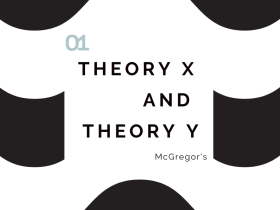Defining management theories and how they can be applied to small businesses.
As the world of business grows, so does the need for management theories that can help small businesses grow. Management theories provide a systematic way to think about how businesses operate and how they can be improved. They can be used to help small businesses identify areas where they need to make changes and develop strategies for growth. By understanding and applying management theories, small businesses can give themselves a competitive edge.
In this article, we will discuss theories of management and how the theories can be applied to small businesses. We’ll also look at some well-known management theorists.
A management theory is a set of ideas that describes how a business should be operated. It is essentially a set of guidelines that describe how to run a business. For example, you might have an idea that increasing employee morale will increase productivity. This idea represents a management theory because it describes how an organization can be run and what factors affect the way it operates.
Management theories are often used as a way for business managers to explain how they make business decisions. While many businesses create their own management theories, some of the most widely accepted theories were created by business theorists. Business theorists are individuals who study business practices and create new theories that will help other businesses run more efficiently. These theorists typically have a background in business or economics, which allows them to understand how businesses operate.
Theories of management:
Management theories can be used to describe the behavior of managers, employees, and organizations. Business theorists have developed numerous management theories over the years that can be used to help businesses grow.
One popular management theory is the contingency theory of leadership, which states that the best leadership style depends on the situation. For example, a manager might need to use a different leadership style when managing a team of experienced employees than when managing a team of inexperienced employees.
Theories can also be used to help managers understand employee behavior. For example, Maslow’s hierarchy of needs is a well-known theory that can be used to explain why employees behave the way they do. By understanding how employees’ basic needs motivate their behavior, managers can better manage and motivate their staff.
Organizational theories can also be useful for small businesses. For example, the organizational culture theory can be used to help small businesses decide whether a formal or informal culture is best for their company. Lets learn different management theories:
1.Classical management theory.
Classical management theories are based on the assumption that organizations are composed of individuals working toward a common goal. The classical approach, also called the bureaucratic approach, has been widely used by businesses and government agencies. It works well in organizations where employees have a clear sense of their roles and responsibilities. The classical approach assumes that employees are rational, autonomous, and self-interested. It also assumes that people are motivated largely by extrinsic rewards, such as money.
2.Scientific Management Theory
The Scientific Management Theory was developed by Frederick Winslow Taylor in the late 1800s to early 1900s. This theory breaks down work into its smallest possible parts and then uses scientific methods to determine the most efficient way to complete the work. The goal of this theory is to increase productivity by reducing wasted time and effort. This theory has been highly influential in the field of management and has led to the development of other theories, such as Taylorism, Fordism, and Lean manufacturing.
3.Bureaucratic management theory.
The Bureaucratic Management Theory was developed by Max Weber in the early 1900s. This theory states that managers can only be successful if they obtain power through bureaucratic structures. These structures are divided into three groups: rational-legal, traditional, and charismatic.
A bureaucracy is defined as a hierarchical organization that has strict rules, roles, and procedures. It also must have a clear chain of command so that each person knows who he or she reports to. Max Weber is best known for his argument of bureaucratic management and its effect on the development of capitalism. Weber argued that bureaucracy was a necessary result of modernity, and would become more prevalent as society became more capitalistic.
4.Contemporary management theory.
Most of the contemporary management theory originates from the Hawthorne studies conducted by Mayo, Roethlisberger and Dickson in 1924. These studies were conducted at Western Electric Co. in Chicago and revealed that the social environment inside an organization affects the performance of workers. The studies concluded that it was possible to increase the productivity of workers by changing the environmental factors in the organization.
The Hawthorne Effect has been studied extensively and reviewed, but several researchers have found no evidence of a manager-worker relationship.
Applying Theories of Management to your small business.
In order to ensure the success of your small business, it is important to apply theories of management. By understanding and utilizing management theories, you can create a successful and efficient business operation. There are a variety of management theories that can be applied to small businesses, such as scientific management, bureaucratic management, and human relations theory.
Each of these theories has its own strengths and weaknesses, so it is essential to choose the one that best suits your needs. By applying the appropriate management theory to your small business, you can create a well-run operation that is able to achieve its goals.
Conclusion:
The theories of management explained in this article each have their own strengths and weaknesses. By understanding these theories and the way they apply to your small business, you can create a successful and efficient operation that is able to achieve its goals.

















